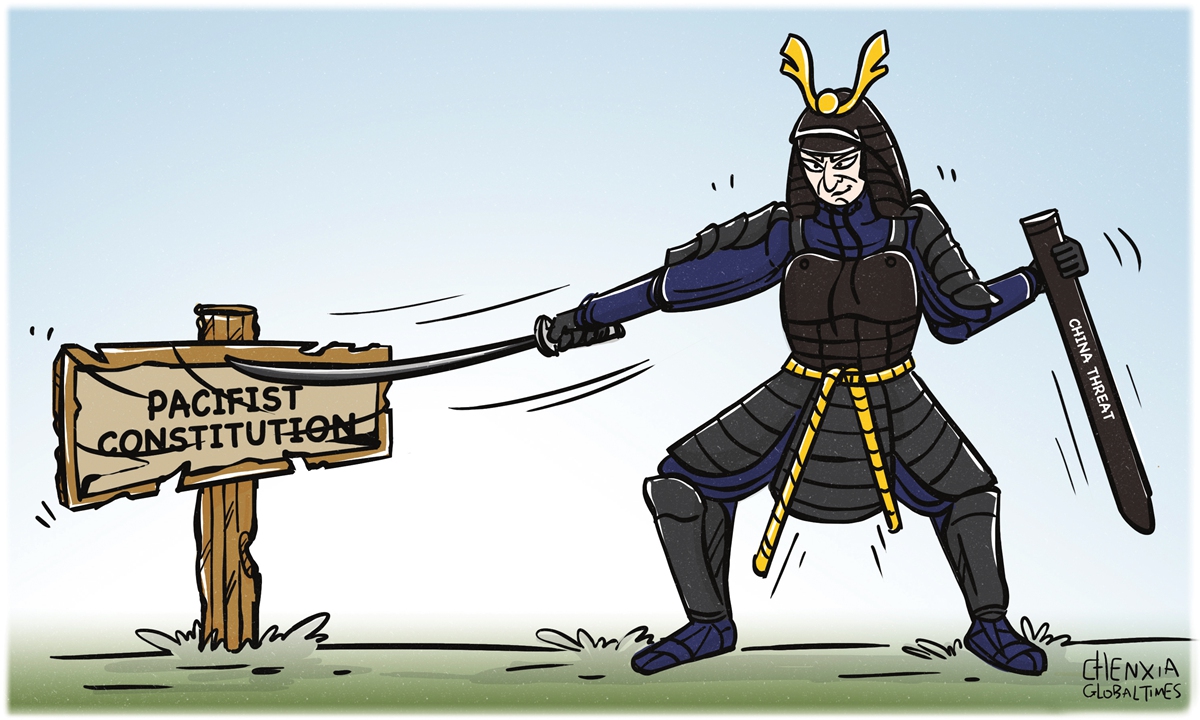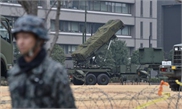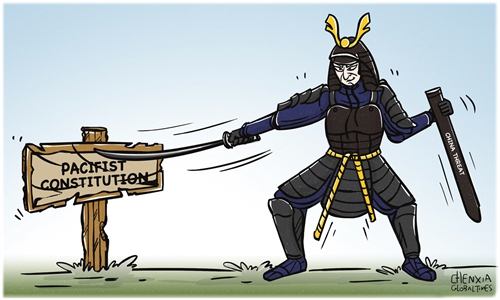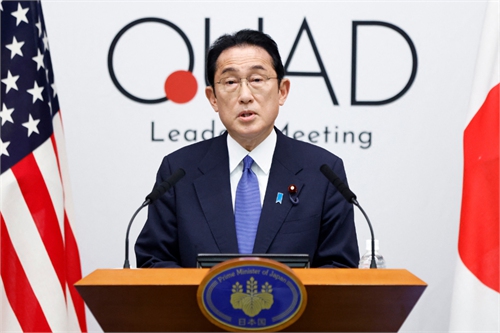Japan weighs up amassing missiles, ramping up cognitive warfare capability amid cross-Straits tensions

Illustration: Chen Xia/GT
Hyping "national security" concerns amid mounting Taiwan Straits tensions, Japan is reportedly mulling the deployment of more than 1,000 long-range missiles capable of reaching foreign soil in a move to close the "missile gap" with China, and also ramping up efforts in the cognitive domain to better cope with information warfare launched by "enemies," with an emphasis on the Chinese language, according to media reports.
Such moves have been seen by Chinese observers as rather dangerous signals that the incumbent Japanese government is moving further along the route set by the late Japanese prime minister Abe Shinzo in his second term, in which the Japanese cabinet constantly floats the "China threat" theory to serve its political agenda of betraying the path of pacifism after its defeat in World War II.
Japan is considering amassing an arsenal of more than 1,000 of its planned long-range missiles, Japan's Yomiuri newspaper reported Sunday, citing unidentified sources with knowledge of the plans. The arms would be stationed mainly around the southern Nansei islands and, when launched by ships or aircraft, are capable of reaching the coastal areas of North Korea and China, the Yomiuri said.
Japan's defense authorities are also planning to expand the budget for survey and research as well as system building to deal with the so-called information warfare launched by enemy countries, said Japan's Kyodo News Agency on Friday, citing several government officials connected with the matter.
After adding three new domains of space, cyberspace and electromagnetic to the 2018 edition Japanese National Defense Program Guideline (NDPG,) media also disclosed that the cognitive domain would become the fourth included in the NDPG in 2023 in addition to the traditional domains of territorial land, waters and airspace, according to Sankei Shimbun.
The building of such cognitive capability would also be written into the National Security Strategy, one of the three major diplomatic and security documents to be amended before the end of 2022, VOA Chinese reported, citing the theory that the Japanese defense authorities and the Self-Defense Force attach great importance to the "misinformation" released by Russia and China, consider that information spread in the Chinese language is a global trend and that cognitive warfare by the island of Taiwan against the Chinese mainland provides valuable experience for research and study.
Song Zhongping, a military expert and TV commentator, said that China should be watchful of the cognitive warfare launched by Japan and the US-led Western countries, which makes use of the non-battlefield instruments such as the internet and media to disrupt the determination of the military and civilians and uses smears and slanders to cause internal collapse.
Analysts said that cognitive warfare is a combination of digital information, media and spy technology that leads public opinion to extremes in order to affect the basis of diplomacy between countries and to realize the goals of political manipulation, citing the US' infamous "peaceful transfer of power" strategy in other countries as an example.
These media reports also convey the same message that the current Kishida administration is following in Abe's footsteps by overturning China-Japan relations stated in the Joint Statement between the Government of Japan and the Government of the People's Republic of China on Comprehensive Promotion of a "Mutually Beneficial Relationship Based on Common Strategic Interests", in which the two sides recognized that they are partners which cooperate and are not threats to each other, Liu Jiangyong, vice dean of the Institute of Modern International Relations at Tsinghua University, told the Global Times on Monday.
A special panel on national security within Japan's ruling Liberal Democratic Party (LDP) has for the first time referred to China as a "grave threat," the Diplomat reported in April. The panel also drew up a draft proposal to provide the Japan Self-Defense Force (JSDF) with what they call a "counterattack capability," including the capability to attack an enemy's command and control systems as well as military bases.
Instead of truly caring about cross-Straits peace and stability, Japan is exploiting the Taiwan question to coordinate the US' geopolitical strategy to contain China and above all, pushing its own political agenda to break the Exclusively Defense-Oriented Policy step by step, and foster a public opinion atmosphere to evade the pacifist constitution, observers pointed out.
Japan has been hooting about boosting its strike capability on foreign soil in 2020 and 2021, and one way to enhance this capacity is to increase its number of long-range cruise missiles, Song told the Global Times, refuting the idea that the move is connected to China's military drills around the Taiwan Straits after US house speaker Nancy Pelosi's provocative visit to the island of Taiwan earlier this month.
Liu noted that Japan's true and major security threats have never come from external factors, but from domestic social ones such as the cult-politics collusion which led to Abe's assassination, and loose epidemic control marked by incumbent prime minister Kishida being diagnosed as positive for COVID-19 on Sunday and daily registration of new cases at more than 200,000 across the country.
If there are any external threats at all, they would be the result of right-wing politicians' efforts to create imaginary enemies, which have backfired on Japan, he warned.




